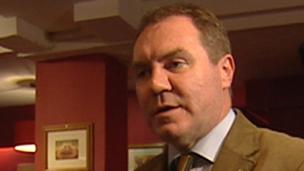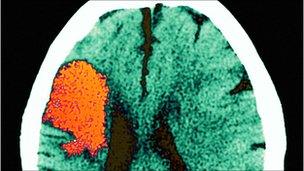Call to boost Scottish stroke support services
- Published

Neil Woodward felt his employer was trying to force him to leave
The Stroke Association in Scotland has called for more stroke survivors to be given access to so-called "advocacy services" to support them.
Stroke is the main cause of impairment and disability in Scotland.
The charity said many people experience problems when they first return to work or go back to family life.
It is calling on Scottish government support to continue funding and expanding services across the whole country.
The Stroke Association highlighted the case of Neil Woodward, 47, who returned to work full-time five months after a stroke.
Although occupational health reports confirmed he could do most of his job, he made mistakes when writing up reports.
Instead of supporting him or offering him an alternative role, he said his employer encouraged him to leave.
Mr Woodward said: "They said I was making too many basic errors. I got the feeling it would be in everybody's best interests if I just left.
"If I had just gone quietly that would have been their ideal."
Under a pilot project, the Stroke Association put him in touch with independent advocate Jacquie Clayton.
The organisation said Ms Clayton's background in nursing and law meant she understood Mr Woodward's physical difficulties but also knew his employer was not complying with the law.
She said: "My role was to give him as much information as possible, to inform him of his rights and to tell him that there were options open to him.
"I've found a lot of younger people who have strokes have difficulty going back into work. In many cases it's due to a lack of knowledge or understanding by the employer."
Informed decisions
Together they successfully fought Mr Woodward's employer's attempts to retire him on half the pension he was entitled to.
The organisation said independent advocates provide a service that is free to the user.

Strokes are one of the main causes of impairment in Scotland
They act as an independent source of advice to support someone's best interests and help them to make informed decisions.
Before the Stroke Association's pilot project, advocacy services were generally only offered to people with mental health problems.
Karen Irvine, advocacy development consultant at the Stroke Association, helped set up the project.
She said: "Of those who survive a stroke, at least half will experience physical, psychological or sensory impairments.
"This can leave stroke survivors feeling vulnerable in certain situations."
The Stroke Association and Advocacy Services are now calling on the Scottish government to continue funding and expand the service, which until now has only been available in Highland, Forth Valley, Lomond, Argyll and Edinburgh.
Shaben Begum, director of the Scottish Independent Advocacy Alliance, said: "Too often it is hard to get the support of an advocate because of the narrow criteria to receive services.
"I hope the service will expand and continue, and be available to those who really need it."